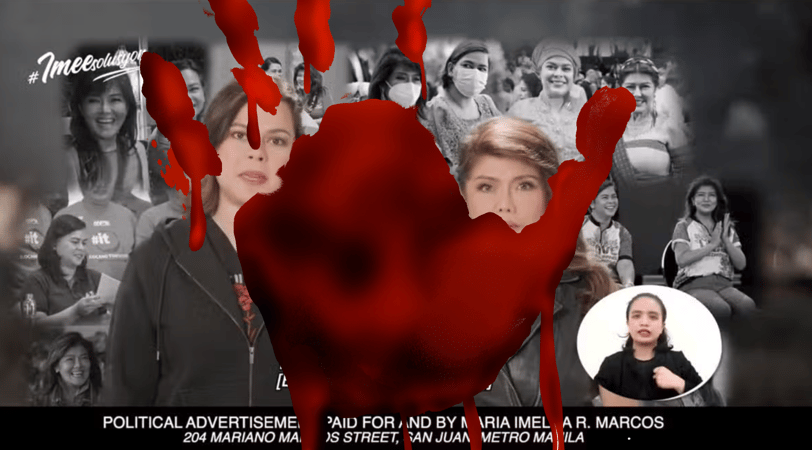Is the Marcos vs. Duterte Feud Just Good for Show?
This blog unpacks the Marcos vs. Duterte feud—not as a genuine clash, but as political theater. From black-clad endorsements to wild assassination claims, what appears to be a power struggle may actually be a strategy to secure dynastic control. While the public stays fixated on the drama, deeper national issues—like education collapse, rising food prices, and shrinking healthcare budgets—are quietly ignored. Because sometimes, what looks like war is just a well-rehearsed dance.


This morning, I watched a campaign ad that’s been making the rounds on social media and television.
Senator Imee Marcos and Vice President Sara Duterte, both dressed in black, stood in stark silence before delivering their lines—somber, dramatic, and full of grief.
“Itim ngayon ang kulay ng bansa sa gutom at krimen, nagluluksa,” Sara said.
“Gutom na ang sikmura, gutom pa sa hustisya. Ginigipit ang hindi ka-alyansa,” Imee added.
And just like that, the ad ended with Sara endorsing Imee’s reelection bid (GMA News).
What they forgot to say was: both our fathers helped shape this darkness we speak of today.
Both were presidents. Both left behind legacies stained with allegations of human rights abuses, cronyism, and social division. But I digress.
Weeks ago, Imee was unceremoniously dropped from her brother’s senatorial slate after defending Rodrigo Duterte and questioning the ICC’s involvement. Now, she’s found her way back into the spotlight, shoulder to shoulder with Duterte’s daughter, casting themselves as victims of the very power they once held.
Sara, who has never meaningfully distanced herself from her father's iron-fisted legacy, now cloaks herself in mourning. Imee, daughter of a dictator, positions herself as the persecuted.
Is this a sincere alliance?
Or is it just another rerun of moro-moro—a staged feud, recycled roles, a political drama where the cast changes costumes, but the ending never does?
The Illusion of Division: Regional Power Secured, Not Shaken
They fought in public, but never on each other’s turf.
That’s the thing about this so-called feud—it may have sounded like chaos, but it was a well-coordinated perimeter check. The Marcoses made sure they kept Luzon. The Dutertes kept Mindanao. No one crossed the line.
When Rodrigo Duterte called for Mindanao independence back in January 2024, it wasn’t just bluster. It was a move—one that fired up his southern base by framing Marcos Jr. as distant, Manila-centric, and indifferent to the south’s needs (East Asia Forum).
And what did Marcos do? He didn’t fight back with guns or policy—he just slashed Sara Duterte’s confidential funds. Quietly, efficiently, and with a look of fiscal responsibility. To his northern base, it was a display of discipline, a reminder that they had elected a man who would keep things under control—even when it involved the Vice President (INCITEGov).
But none of it was new. The 2022 UniTeam wasn’t a unity of ideas—it was a merger of numbers. Luzon plus Mindanao equals Malacañang. That was the formula. And once the job was done, they split again. Not in principle. Just in geography.
Now the black-clad ad brings them together again—not as partners, but as political survivors who know exactly where they stand.
The feud served its purpose: polarize the country, draw the maps again, and keep both kingdoms intact.
While We Watched the Show: The Real Issues Quietly Got Worse
While the cameras stayed fixed on the Marcos-Duterte rift—on who snubbed who, who stole whose budget, and who looked better in black—some things were quietly crumbling in the background.
Let’s start with education.
As of today, nine out of ten Filipino ten-year-olds can’t read or understand age-appropriate text. That’s not alarmist exaggeration—it’s national data. But instead of addressing this crisis, we’re watching political families trade barbs and endorsements like it’s a variety show (GMA News, INCITEGov).
Meanwhile, the price of rice continues to rise. Food inflation is a daily burden for millions, especially the poor—yet most of the media coverage focuses on whose loyalists are attending which rally. Our farmlands are drying up. Farmers are barely surviving. And somehow, the nation seems more enraged by political shade than by the fact that a sack of rice is fast becoming a luxury (Inquirer Opinion, Nikkei Asia).
Then there’s the budget. The 2025 national budget is now under legal scrutiny. Health programs are being slashed—including PhilHealth—while education gets sidelined again in favor of massive infrastructure projects and line items that look more like political favors than public service (PIDS).
And somehow, while all this is happening, we’re still entertaining the wild claim—publicly made by Sara Duterte herself—that she had spoken to an assassin sent to kill President Marcos, First Lady Liza Araneta-Marcos, and House Speaker Martin Romualdez. No evidence, no formal complaint, just the statement dropped like a grenade into the middle of an already broken conversation.
Add to that the unexplained confidential funds, her history of questionable public spending, and stalled investigations that no longer trend—yet we watch her stand in mourning black beside Imee Marcos and accept the narrative that she is the one being persecuted.
This is the damage that spectacle does.
We watch the feud. We take sides. And while we’re busy arguing over which dynasty is less corrupt, the systems meant to serve us fall apart in silence.
The Feud as Firewall: Keeping Reformers Out, Dynasties In
In every election cycle, we hear the same line: “At least may pagpipilian.”
But when both choices carry the weight of political dynasties, it’s not a choice—it’s just a rerun.
The Marcos-Duterte feud has created a binary so loud, so all-consuming, that everyone else has been pushed out of the frame. You’re either with this camp or that one. Anything in between? Forgotten. Unheard. Unfunded.
And maybe that’s the point.
Because while we argue over which dynasty is the lesser evil, both sides continue to benefit from the same system that protects them. The same system that has allowed political dynasties to control over 80% of congressional seats and nearly 78% of governorships in this country (IAIS).
This isn’t public service. This is bloodline management.
Elections don’t feel like regime change anymore. They feel like coronations—or worse, family reunions with billion-peso budgets and black-and-gold banners. Nothing changes except the staging.
And while they keep pretending to fight, the conversations that matter—anti-dynasty laws, political education, campaign finance reform—get buried under tarpaulins and hashtags.
Reformers don’t lose because they’re weak. They lose because the stage was never built for them.
Because as long as the public is kept busy watching two families clash, no one asks why we’re still being ruled by the same names after all these years.
One Country, Two Foreign Policies: Playing Both Sides for Power
We don’t just have two political dynasties.
We also have two foreign policies.
On one side, you have President Marcos Jr., flying to Washington, Tokyo, and Canberra, talking about defense, cooperation, and standing up to China’s aggression in the West Philippine Sea. The U.S. loves it. Joint military drills are expanding. Bases are being opened. Photos are taken. Statements are made.
On the other side, you have the lingering shadow of Rodrigo Duterte—still defending China, still calling the U.S. “meddlesome,” still reminding everyone that he was the one who brought in the Chinese infrastructure money to Mindanao. And if you listen closely, Sara Duterte hasn’t exactly taken a firm stance on the West Philippine Sea either. Quiet is a position, too.
So here we are. One country, two directions.
And while it may look chaotic from the outside, it’s actually a clever balancing act. Because when two factions carry influence over two global powers, the Philippines becomes a country no one can afford to lose.
Marcos aligns with the ICC and cooperates with Western institutions—he gets credibility abroad. Duterte rejects the ICC and frames himself as a victim of Western interference—he becomes a nationalist hero at home.
Both camps become indispensable. Both sides get courted. And whether it’s Washington or Beijing, someone will always want a seat at either table.
This isn’t foreign policy. This is leverage disguised as loyalty.
And just like their domestic feud, this tug-of-war with global powers doesn’t destabilize the dynasty—it strengthens it.
The 2028 Setup: Whoever Wins, the Dynasty Stays
This was never just about now.
Everything—the black mourning clothes, the public spats, the surprise endorsements—is part of a long game. A setup for 2028.
Sara Duterte is being rebranded, one ad at a time. After being denied confidential funds and removed from the Marcos slate, she didn’t disappear—she recalibrated. She stayed silent when it suited her. She showed up when it mattered. And now, she stands beside Imee Marcos, dressed for a funeral, speaking like someone wronged.
It's not a breakdown. It’s a relaunch.
She’s no longer the administration’s second-in-command. She’s now the opposition’s chosen daughter. The underdog. The wronged woman. The Duterte with just enough distance from her father’s legacy to run on it—and just enough shadow left to inherit his base.
Meanwhile, Marcos Jr. is polishing his own narrative. The foreign visits. The “Bagong Pilipinas” slogans. The diplomatic wins. The quiet departure from Duterte’s bloody rhetoric. He’s not confronting the past—he’s skipping over it. Repackaging himself as clean and forward-looking, hoping people forget where he came from.
He may not be running in 2028, but make no mistake—someone he blesses will.
So here’s how this ends.
One camp puts forward a loyalist. The other crowns a Duterte. And we’re told we have a choice.
But it’s not a choice. It’s a loop.
One house versus another. Old names, new posters. A campaign where the outcome is already familiar.
Because this was never a feud. It was a script.
And whoever wins, we all lose.
Conclusion: The Illusion of Choice, the Reality of Control
Because that’s what this is.
Not a feud. Not a crisis. Not even a choice.
Just a show.
A political drama with high production value and predictable plot twists—designed to keep us entertained, divided, and too distracted to notice that nothing’s actually changing. That the same families still hold the mic. That the country is still bleeding from the same wounds.
We’ve seen this play out before. We’ll see it again.
One camp frames themselves as the savior. The other as the wronged. And somewhere in between, the idea of real reform gets buried under campaign ads, memes, and tarpaulins.
By the time we get to 2028, the script will be complete. A Marcos-backed slate on one side. A Duterte comeback on the other. And both claiming they’re the answer.
But the truth is—they’re the same question. Just wearing different colors.
The real danger isn’t that they keep doing this. It’s that we keep falling for it.
Because until we stop clapping for the show,
the curtain will never fall.
Contact us
subscribe to morning coffee thoughts today!
© 2024. All rights reserved.


